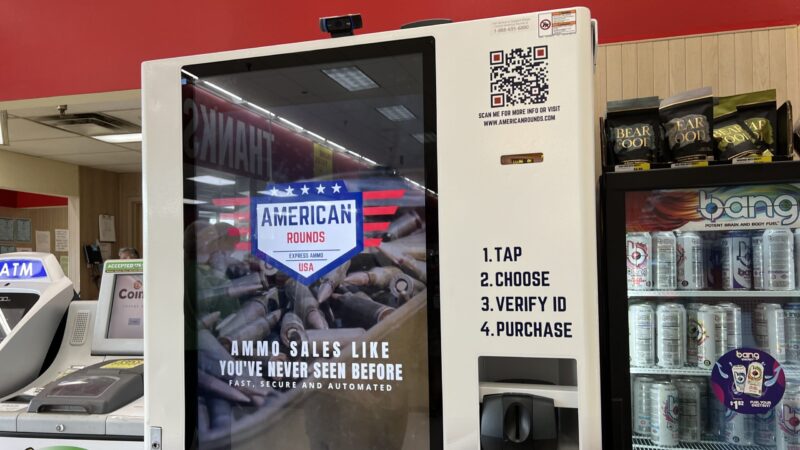Gun violence prevention advocates question ammo machines in Alabama
By Sara Güven, Reflect Alabama Fellow, and Richard Banks
Standing between a coin-to-cash machine and a refrigerator of energy drinks, a new vending machine at a Fresh Value grocery store in Pell City, Alabama, offers something more than a quick snack or drink — bullets.
The machine is operated by American Rounds, a Texas-based company. To purchase ammunition, customers agree to terms and conditions on the machine’s large touchscreen, make their selection, and then verify their identity and age by inserting their ID and submitting to facial recognition.
American Rounds CEO Grant Magers says his company’s vending machines are safe. He told NPR recently the devices are 2,000-pound, triple-locked, double-walled steel boxes that operate indoors, and are monitored by security cameras.
He said they are the safest and most secure method of ammo retail sales on the market today.
Alabama is now one of at least four states where AI-powered vending machines sell ammunition. According to a spokesperson for the Bureau of Alcohol, Tobacco, Firearms and Explosives, it’s perfectly legal, but gun violence prevention advocates said that’s the problem.
“The thing that is shocking is that our federal laws with respect to ammunition sales are so weak in this country that something like this is possible,” said David Pacino, the legal director for Giffords Law Center to Prevent Gun Violence.
That’s the organization former Arizona Congressperson Gabby Giffords formed after she and 18 other people were shot in 2011. Pacino added, with a vending machine, there’s virtually no way to stop someone prohibited from purchasing ammo from doing so, as long as they are of legal age.
“While it’s illegal for people with certain criminal histories or other disqualifying facts to buy ammunition, there’s no check to make sure that somebody is prohibited, doesn’t buy them,” Pacino said.
In most states, a store clerk selling ammo has the responsibility to stop a sale in certain situations. For instance, if a person is inebriated or seems mentally unstable.
“If you have a human being who is on the other side of that sale, they can have a responsibility and do have the responsibility to make sure at least some of the most egregious forms of misconduct, or the most egregious red flags, aren’t being met,” Pacino said.
Nick Suplina is the senior vice president for law and policy at Everytown for Gun Safety. He liked the technology American Rounds is using, just not on a vending machine.
“Innovations that make ammunition sales more secure, like facial recognition, age verification or potentially tracking serial sales are promising safety measures, but they belong in gun stores, not in the place where you buy your kids milk,” Suplina said.
Alabama Democratic State Representative Phillip Ensler, who has supported gun control bills, said he’s heard from constituents who are concerned about the vending machines.
“Residents feel that these machines send the wrong message and impose potential risks of access to ammunition for people who shouldn’t be able to obtain them,” Ensler said.
Until recently, though, customers didn’t seem to take to the idea of buying ammo in a grocery store.
“Before all this, I hadn’t even seen anybody really buying anything,” said Fresh Value’s co-manager Patrick Embry. “Since the publicity, people are picking it up now,”
Pacino, the legal director for Giffords, said the potential of someone buying ammo who shouldn’t from one of these machines is a huge liability.
“I am thankful and will count my blessings every dying day that I am not a lawyer or a counsel to a company that’s doing something like this. But if I was, I would be horrified by it,” Pacino said.
North Carolina and Texas have primary elections Tuesday. Here’s what you need to know
The midterm elections are officially underway and contests in Texas and North Carolina will be the first major opportunity for parties to hear from voters about what's important to them in 2026.
Trump promised the MAGA base no new wars. Then he went to war with Iran
President Trump promised his "Make America Great Again" voters an "America First" foreign policy. With the war in Iran, he's testing MAGA world's willingness to be flexible on one of its core beliefs.
Kristi Noem set to face senators over DHS shutdown, immigration enforcement
The focus of the hearing is likely to be on how Kristi Noem is pursuing President Trump's mass deportation efforts in his second term, after two U.S. citizens were killed by immigration officers.
College students, professors are making their own AI rules. They don’t always agree
More than three years after ChatGPT debuted, AI has become a part of everyday life — and professors and students are still figuring out how or if they should use it.
Melania Trump presides at UN Security Council meeting as U.S. attacks Iran
U.S. first lady Melania Trump presided over a U.N. Security Council meeting on Monday focusing on children in conflict, as the United States has joined Israel in attacking Iran.
In Vermont, small town meetings grapple with debate on big issues
Typically concerned with local issues, residents at town meetings in Vermont and elsewhere increasingly use the forum to debate polarizing national and international events.








